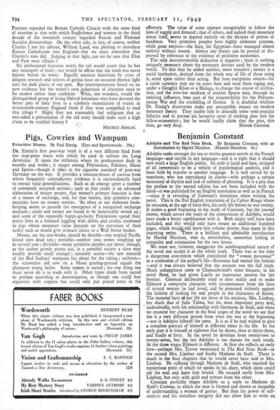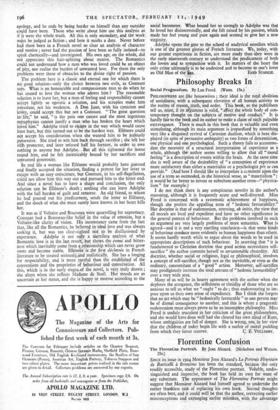Benjamin Constant
Adolphe ranks amongst the ten or twelve greatest novels in the French language—and maybe in any language—and it is right that it should now reach a large English public. Its style is lucid and bare, stripped of all inessentials to be a vehicle of psychological analysis, and it loses little by transfer to another language. It is well served by its translator, who has reproduced its clarity—with perhaps a certain monotony of rhythm and lack of subtlety of phrasing. It is a pity that the preface to the second edition has not been included with the third—it was published for an English translation as well as in French —since it is revealing of Constant's intentions when writing the novel. This is the first English translation of Le Cahier Rouge where he recounts, at the age of forty-five, his early life before he was twenty. It makes a good beginning to the study of Constant, but the journal intime, which covers the years of the composition of Adolphe, would have made a better ccanbination.with it. Both might well have been included, and this would only have meant an additional hundred pages, which wonla still leave this volume shorter than many in this charming series. -Mie is a brilliant and admirable introduction by Harold Nicolson, who is, nevertheless, somewhat lacking in sympathy and compassion for the two lovers.
We must not, however, exaggerate the autobiographical nature of the novel nor accept it as the whole truth. There was at the time a dangerous convention which considered the "roman personnel" as a confession of ,the author's life—Rousseau had started the fashion —and it was alwaYs believed that the account was the full truth. Much unhappiness came to C.hateaubriand's sister because-' in his novel Rene, he had given Lucile an incestuous passion for her brother. Constant deliberately tried to alter reality and to make Ellenore a composite character with circumstances from the lives of several women he had loved, and he protested violently against the fashion of looking for real people in the characters of fiction. The material facts Afiliter life are those of his mistress, Mrs. Lindsay, her death that of Julie Talma, but the most important parts deal, • undoubtedly, with his relationship with Germaine de Stael, and when we examine her character in the final stages of the novel we see that she is a very different person from what she was at the beginning —nor is Adolphe tuTh.self the same. It is as if he had wished to give a complete portrait of himself at different times in his life. In the early part it is himself at eighteen that he draws, then at thirty-three, and finally at forty. In the novel he develops from twenty-two to twenty-seven, but the last Adolphe is too mature for such youth. At the throe stages Ellenore is different. At first she reflects an early love—perhaps Mrs...Trevor mentioned in The Red Note Book—in the second Mrs. Lindsay and finally Madame de Stag. There is much in the final chapters that he would never have said to Mrs. Lindsay. He suffered through Madame de Stael, who touched the mysterious point of which he speaks in his diary, which alone could stir his soul and leave him bound. He escaped easily from Mrs. Lindsay, but only with guilt and torture from the other.
Constant probably began Adolphe as a reply to Madame de Steers Corinne, in which the man is blamed and shown as incapable of understanding a woman of genius. But then his power of self- analysis and his merciless integrity did not allow him to write an,
apology, and he ends by being harder on himself than any outsider could have been. Those who write about him use this analysis as ' if It were the whole truth. All this is only secondary, and the work• miist be judged as fiction and here it marks a date. Never before had there been in a French novel so clear an analysis of character _ and motive ; never had the passion of love been so fully isolated—to. speak chemically—and investigated. His own age, on the whole, did not appreciate this hair-splitting about motive. The Romantics cotild not understand how a man who was loved could be an object of ;Pity, nor realise the burden of unwanted love. For them the only problems were those of obstacles to the divine right of passion.
The problem here is a classic and eternal one for which there is mi. good solution—only the choice between two evils, as Constant says. What is an honourable and compassionate man to do when he has ceased to love the woman who adores him ? The reasonable solution is to leave her, but a man of feeling and responsibility cannot adept lightly so egoistic a solution, and his scruples make, him iriesolute, not his weakness. A Don Juan, with his cynicism and
could accept this but not a Constant "The great question. inr,life," he said, "is the pain one causes and the most ingeniousi metaphysics cannot justify a man who has broken the heart Which' loVed him." Adolphe tried to elpipe in the way which would cause least hurt, but this turned out to be the hardest way. Ellenore Could not accept his consideration when she wanted him to be jeatOusly pOtsessive. She tried to wilt him back through sacrifice ; she left her ritla protector, and later refused half his 'fortune in order to; owe- nothing to anyone but Adolphe.,- -But all this tightened the noose round him, and he felt inextricably bound by her sacrifices and unWanted generosity. in real life a woman like Ellenore would probably have guessed and finally accepted the situation, finding a pretext for her lover to eseape with an easy conscience, but Constant, in his self-flagellation, ccitild not allow him this way out and pursued him. to the bitter end. And since 4 novel has to have a- shape and conclusion, the .only. solution can. be Ellenore's death ; nothing else can leave Adolphe' with the full burden of guilt and remorse. An old friend, to Whom he had poured out his predicament, sends the letter to Ellenore„ and the shock of what she must surely have known in her heart kills her.
It was as if Voltaire and Rousseau Were quarrelling for supremacy. Constant had a Rousseau-like belief in the value of emotion, but a. Voltaire-like clarity of vision. His inconstancy came from the fact that, like all the Romantics, he believed in-ideal-love and was always seeking it, but was too clear-sighted not to be disillusioned by experience. Adolphe is not only a merciless analysis. of what Romantic love is in the last resort, but shoWs the ennui and bitter- ness which inevitably come from 4 relationship, Which can never grow roots and become stable. Ell4nOre is the first declassie in French literature to be treated seriously;and realistically. She has a longing for respectability, and is more careful than the established of the conventions and the proprieties Of behaviour and conversation. All this, which is in the early stages.of the novel, is very, truly drawn ; she alters when she reflects Madame de 'Stael. Her Moods are as uncertain as her status, and she is' happy or morose according to the
social barometer. What bound her so strongly to Adolphe was that he loved her disinterestedly, and she felt raised by his passion, Which made her feel young and pure again and seemed to give tier a new virginity.
Adolphe opens the gate to the school of analytical novelists which is one of the greatest glories of French literature. We, today, with our greater experience in fiction, are more ready than -dley were in the early nineteenth century to understand the predicament of both the lovers and to sympathise with it. In matters of the heart the only crime -ultimately is to be undesired and to become to one's lover







































 Previous page
Previous page